Britain’s new prime minister Boris Johnson and U.S. President Donald Trump may have chemistry, but the complexities of Brexit will affect Johnson’s foreign policy decisions, Amanda Sloat argues. The “special relationship” between the United States and the United Kingdom has been under strain since Trump took office and Johnson may find Trump a fickle friend. This article originally appeared in The Hill.
Given enduring ties between the United States and the United Kingdom, there has always been a fascination with the personal bonds between those stewarding the “special relationship.”
The most memorable pairings have been leaders who were like-minded or committed to a shared cause. Franklin Roosevelt and Winston Churchill, aristocrats from opposing partisan camps who teamed up to fight the Nazis. Ronald Reagan and Margaret Thatcher, “political soulmates” who supported freedom and free market economics. Bill Clinton and Tony Blair, young leaders who responded to globalization by championing a “third way” approach.
The combination of Donald Trump and Boris Johnson, both of whom came from privileged backgrounds and rode populist waves into office, has heightened expectations of renewed alignment between America and Britain. Their personal chemistry, shared antipathy toward the European Union and desire for a trade deal will improve bilateral ties in the near term. There will be a honeymoon period, including their first meeting next month at the G7 summit in France. Yet there will also be friction as Johnson seeks to balance domestic and foreign policy interests.
The bilateral relationship has been under strain since Trump took office. My colleague Tom Wright has argued “no ally has been more tormented by him than the United Kingdom.” Trump repeatedly criticized former Prime Minister Theresa May’s handling of Brexit; disregarded British concerns on climate change and Iran policy; accused British intelligence of spying on him; and attacked London Mayor Sadiq Khan following terrorist attacks there. Relations tanked in early July after British Ambassador Kim Darroch’s classified cables critiquing the Trump administration were leaked.
It is tempting to overstate the leaders’ similarities, with even the American president referring to Johnson as “Britain Trump.” Johnson has employed similar populist tactics, including dramatic rhetoric and outright lies. Yet he is better seen as unconventional and opportunistic. He is driven by ambition; having served as London mayor and foreign secretary, he has finally achieved his lifelong dream of becoming prime minister. He is an old school Tory with socially liberal and fiscally conservative views. His track record suggests an international outlook, including support for the United Nations, NATO, Iran nuclear deal, and Paris climate accords. He is not particularly ideological, with his views—such as the decision to champion Brexit—guided by his aspirations. As Atlantic commentator Tom McTague wrote, “Johnson’s rare gift is to combine unabashed elitism with popular appeal.”
Brexit will dominate Johnson’s early tenure, as he took office 99 days before the October 31 deadline. He faces the same challenges as his predecessor: EU leaders are unwilling to renegotiate the withdrawal agreement (including the unpopular Northern Ireland backstop) and the British parliament lacks support for any single option. His “do or die” promise to remove the UK from the EU by Halloween has required increased planning for a no-deal Brexit, which could be chaotic and economically disastrous. Johnson’s hardline approach may lead to early elections; his selection by Tory party members alone gives him a mandate from less than 0.1 percent of the country, with 58 percent of voters viewing him negatively.
The complexities of Brexit will affect Johnson’s foreign policy decisions, including Britain’s strategic alignment. Although Trump has championed a free trade agreement, Johnson will confront an uncomfortable reality: if the UK deviates from EU economic rules, there will be more freedom to negotiate trade deals yet greater need for intrusive customs checks on the Irish border. Congressional leaders have warned that a no-deal Brexit resulting in a hard border and destabilizing the Northern Ireland peace process would jeopardize their support for a trade deal.
Johnson will also face early questions on China and Iran. He must determine whether Britain includes China’s Huawei in its 5G telecoms network. Trump opposed May’s preliminary decision and Johnson promised not to compromise intelligence sharing with Five Eyes partners. Yet Britain’s weakened economy will need foreign investment, with Johnson previously describing his country as “very pro-China.” On Iran, Johnson must decide whether to support Trump’s maximum pressure campaign. After Tehran seized a British-flagged tanker, May’s government pursued a European naval force—rather than the multi-national force proposed by Washington—to ensure safe shipping in the Strait of Hormuz. In addition, Tehran set a September 5 deadline for nuclear deal signatories to counter US sanctions.
Johnson must choose carefully. Many of his policy views are closer to his continental neighbors than his transatlantic partner, but his hostility toward the EU and the looming Brexit deadline make diplomatic alignment awkward. Although pursuing greater proximity to America is a tempting alternative, Johnson will learn—as did his predecessor—that its current leader is a fickle friend.
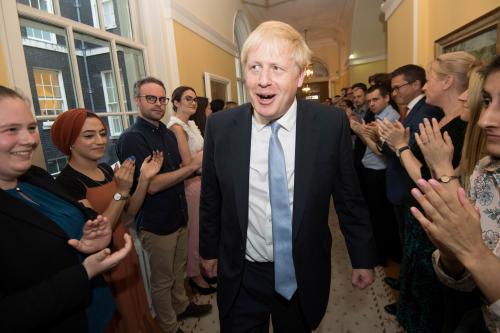
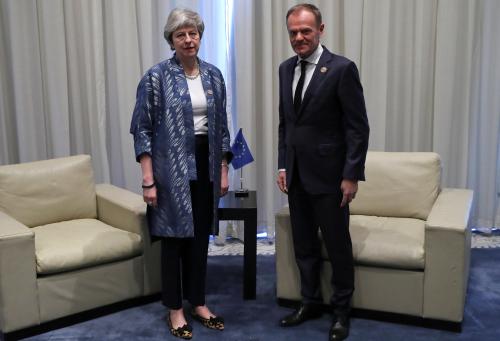
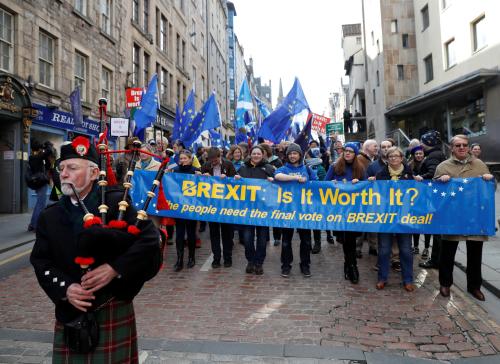

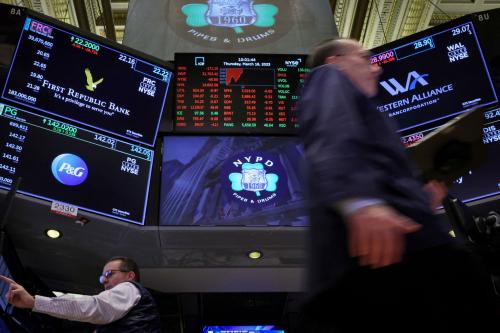
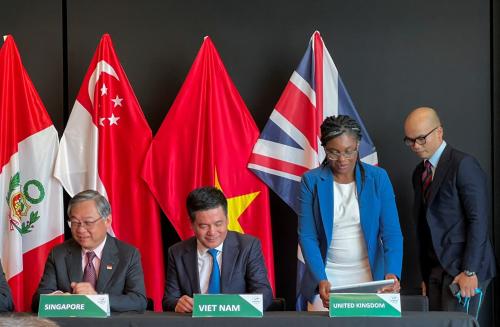
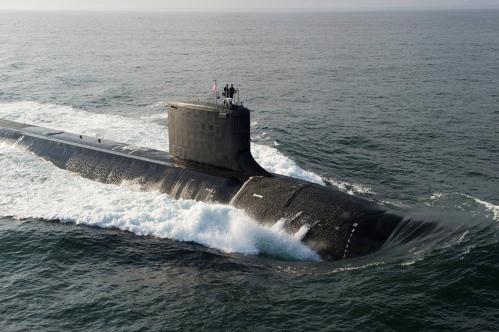
Commentary
What Boris Johnson means for US-UK relations
July 31, 2019